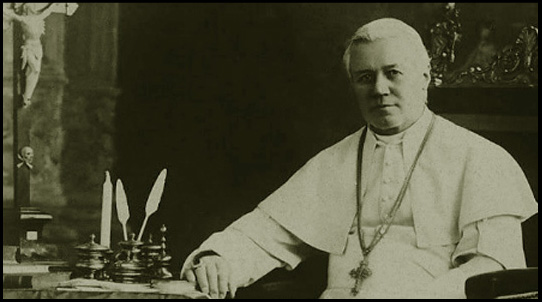
A Condemnation of the Errors of Modernism
according to the "Encyclical Pascendi Dominici Gregis", of his Holiness, Pius X., 1907  "This Catechism reproduces, in its entirety and in the exact order of its ideas, the Encyclical of our Holy Father the Pope On the Doctrines of the Modernists. The Text used is that of the Official Translation published with authority. The divisions and subdivisions are those that are found in the French version issued by the Vatican Press." Listed below are excerpts from this timely work of Pope St. Pius X.:
Q. How can one, in one word, define Modernism?
A. 'Now, with Our eyes fixed upon the whole system, no one will be surprised that We should define it to be the synthesis* of all the heresies.'--Page 94 Q. Why do you define Modernism to be the rendezvous of all the heresies? A. 'Undoubtedly, were anyone to attempt the task of collecting together all the errors that have been broached against the Faith, and to concentrate into one the sap and substance of them all, he could not succeed in doing so better than the Modernists have done.'--Page 94 Q. Is it enough to affirm that, by their multiplied errors, the Modernists would destroy the Catholic religion? A. 'Nay, they have gone farther than this, for, as We have already intimated, their system means the destruction not of the Catholic religion alone, but of all religion.'--Page 94 - 95 Q. What are the stages in this descent of the human mind towards the negation of all religion? A. 'The error of Protestantism made the first step on this path; that of Modernism makes the second; Atheism will make the next.'--Page 100 Q. Are the Modernists zealous to enlist new recruits? A. 'What efforts do they not make to win new recruits!' Q. What are their principal means of conquest? A. 'They seize upon professorships in the seminaries and Universities, and gradually make of them chairs of pestilence. In sermons from the pulpit they disseminate their doctrines, although possibly in utterances which are veiled. In congresses they express their teachings more openly. In their social gatherings they introduce them and commend them to others. Under their own names and under pseudonyms they publish numbers of books, newspapers, reviews, and sometimes one and the same writer adopts a variety of pseudonyms, to trap the incautious reader into believing in a multitude of Modernist writers. In short, with feverish activity they leave nothing untried in act, speech, and writing.'--Page 111 Q. How may their (Modernist) doctrines be described? A. Methods and doctrines replete with errors, made not for edification but for destruction, not for the making of Catholics but for the seduction of those who are Catholics into heresy ; and tending to the utter subversion of all religion.--Page 90 Q. What more serious reforms do the Modernists call for in the government of the Church? A. They cry out that ecclesiastical government requires to be reformed in all its branches, but especially in its disciplinary and dogmatic departments. They insist that both outwardly and inwardly it must be brought into harmony with the modern conscience, which now wholly tends towards democracy. A share in ecclesiastical government should, therefore, be given to the lower ranks of the clergy, and even to the laity, and authority, which is too much concentrated, should be decentralized.'--Page 92 To download the entire book, click on the link below. Download the book, "Catechism on Modernism" The background image is licensed under Creative Commons Attribution-Share Alike 3.0 Unported by MatthiasKabel http://catholicharboroffaithandmorals.com/ |